
by hjunderway | Nov 18, 2013 | 2013, Bilingual, Cultural Differences, Culture, Education, Expat Life, Eye on Culture, France, International, Living Abroad, Milestones, Motherhood, Moving, Preschool, Relocating, School, Stress, Traditions, USA, Working Mother, World Moms Blog, World Motherhood, Younger Children
 The day I gave birth to my son, HJ, is a day I’ll never forget. Induction nightmare? Check. Post baby snuggles? Check. September 3rd birth date? Check.
The day I gave birth to my son, HJ, is a day I’ll never forget. Induction nightmare? Check. Post baby snuggles? Check. September 3rd birth date? Check.
Little did I know at the time how much my son’s birthday would impact his development and education but flash forward to 2013 and here I sit, faced with the first of many educational concerns.
Living in Paris meant that on September 4th, 2012, my son formally entered the French education system. At just three years old, he was invited to attend nursery school, or maternelle, which comprises the first three years of schooling. Due to his inability to speak French, my son was invited to attend school four mornings per week from 8:30 a.m. until 11:40 a.m. As he began to thrive in school, his teacher gently suggested that I begin leaving him for one full-day per week after the holiday break in December. By late-January, he was attending school all day until 4:15 p.m., eating French catered lunch in the cantine (cafeteria), enjoying rest time, and thriving.
Combining his easy going attitude and tall stature (95% percentile for height), most parents thought my son was one of the older kids in the class. In order to start school in September, children must turn three by December 31st, and with a September 3rd birthday, my son was one of the younger students. When I would share this with the parents, they’d say, “Wow, but he is so tall!”
Our plans for HJ’s education were that he would be in French school until we moved home, and at that point he’d transition into kindergarten at the local school. When our contract ended sooner than expected, I began the joyous task of figuring out what options we had to continue HJ’s formal education, and the results were shocking.
HJ misses the US cut-off for kindergarten by two days. This means that he has to wait until he is six to enter kindergarten! I neatly placed that reality aside and instead focused on what education he could receive now, at four years old.
My choices floored me.
Option A) the public school offers a “lottery” for kids ages 3-4 for preschool, and the schedule only allows kids to get one of three spots: two mornings from 8-11, three mornings, four afternoons, or five mornings. And all this for the staggering price of more than $6,000.
Option B) the local Montessori school, which has no openings until September of 2014, and again runs mornings only. Did I mention that they also refused to reveal the actual cost of the program?
And finally, Option C) a local Catholic school that offers five all-day classes for around $7,000.
So what’s the big deal?!
Children in France have access to all-day education beginning at age three for FREE, with master’s degree trained teachers. While every school isn’t as amazing as the one my son attends, the French may be on to something. For two working parents, morning-only, formal education settings are an inconvenience, and for single-income families, shelling out over $6,000 for a few hours a day may be too much.
All around the United States, parents are struggling with making hard financial decisions and I wonder if it seems fair that we have to do so when it comes to our children’s educations?
For us, having HJ evaluated and exploring how he measures up to his peers is one solution. How he falls in the range of social and emotional intelligence will give us a window into how he may fair in kindergarten and will be necessary if we plan on fighting the school district for a spot in kindergarten if it seems logical and appropriate for our son.
The second option is to just ride the wave and instead allow our six year old to join his peers, perhaps giving him a leg up on his classmates. Then I question, “Will he be bored?” “Too big?” At this point I’m just not sure which choice is best for our little guy but it did get my wheels moving, wondering about the significant differences in how each country approaches education. What is it like for children in Germany, or Canada? Do parents struggle with similar issues in Sydney, Australia?
So please, World Moms Blog readers, share your location/country’s educational process! When does school begin? When did your children start school? Anything you wish you could change about your child’s educational experiences?
This is an original post to World Moms Blog from Jacki, mother of one now living in XXX but formerly blogging from Paris, France.
Jacki, or “MommaExpat,” as she’s known in the Internet community, is a former family therapist turned stay-at-home mom in Paris, France. Jacki is passionate about issues as they relate to mothers and children on both domestic and international scenes, and is a Volunteer Ambassador for the Fistula Foundation. In addition to training for her first half marathon, Jacki can be found learning French in Paris and researching her next big trip. Jacki blogs at H J Underway, a chronicle of her daily life as a non-French speaking mom in France.
More Posts

by Sisters From Another Mister | Nov 12, 2013 | 2013, Humanitarian, Shot@Life, Social Good, Vaccines, World Moms Blog
The next twitter party will take place today Tuesday, November 12th
from 1-2pm EST, and later in the day,
another one at 9-10pm EST to accommodate time zones on MDG4!
The hashtag is #Moms4MDGs,
and we encourage all moms around the world to join in the discussion!
This month’s topic is child survival!

There are many bright spots in my life for which I am very thankful and writing for World Moms Blog is definitely a highlight. The lovely Jennifer being a close friend is another. World Moms Blog, a group of writers spread across the globe – are near and dear to me and thanks to Jenn, I was asked to be a Champion for Shot@Life which brought another group of ladies into my life that have blessed me beyond measure.
Hang on a second … here we go … an impromptu gathering on the streets of NYC!

Social Good Summit NYC
I would go anywhere in the world with these ladies!
And just what can all this goodness get together and do?
We can use our voices for change, we can use our voices for good, and together we can make a difference. Thanks to shot@life I step out of my comfort zone from time to time, earlier this year I interviewed a radio personality – on air. Yes – LIVE! For their Get a Shot/Give a shot campaign with Walgreens. Then at the Social Good Summit – I spoke on stage, well, I possibly shook more than I spoke … baby steps indeed compared to the hugeness of acts of others, but I am feeling my way, trying to make a mark in the world, and hoping to teach my children that we have a responsibility to those less fortunate along the way.
November 12th is World Pneumonia Day, I have had pneumonia twice in the last year and a half. It was not pretty. I was told that the lungs are our grief organ, so perhaps while I wanted everyone to believe on the outside that I was doing just fine, my body called my bluff. But here in the US, I had breathing treatments, steroids, medical attention and the option to have the vaccine the minute my body was ready for it. Elsewhere in the world, under different circumstances – my future may have hung in the balance.
Did you know that …
Pneumonia is the #1 killer of children under age 5 worldwide. 99% of all childhood deaths from pneumonia occur in the developing world.
Pneumonia is solvable Pneumonia is one of the most solvable problems in global health. We have the safe, effective and affordable tools necessary to help prevent children from contracting pneumonia and to treat those suffering with this illness. We can win the fight To advance progress, we must continue to scale up interventions that we know will save children’s lives, including continued access to vaccines, proper antibiotic treatment, improved sanitation, as well as the promotion of practices such as breastfeeding, frequent hand washing, care seeking, and the use of clean cookstoves to reduce indoor air pollution.
shot@life and The UN Foundation have opened my eyes to the plight of so many worldwide. I hope that you can join us and use your voice … there are children the world over counting on you.
Mark your calendars … make a difference!

P.S. Never been to a twitter party before? Go to www.tweetchat.com and put in the hashtag: “#Moms4MDGs during the party times. From there you can retweet and tweet and the hashtag will automatically be added to your tweets. And, from there you can also view all of the party tweets!
This is an original post to World Moms Blog by contributor Nicole M. whose writing can also be found at SistersFromAnotherMister
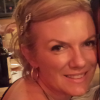
Sisters From Another Mister ...
A blog born from the love of 'sisters' around the world who come together to lift eachother up no matter where they are on their life journey.
Meet Nicole, a transplanted British born, South African raised, and American made Mom of two girls living on the sunny shores of South Florida, USA. A writer of stories, an avid picture taker and a keeper of shiny memories.
Sharing the travels of a home school journey that takes place around the globe - because 'the world truly is our classroom'. Throw in infertility, adoption, separation, impending divorce (it has its own Doom and Gloom category on the blog) and a much needed added side of European humor is what keeps it all together on the days when it could quite clearly simply fall apart! This segues nicely into Finding a Mister for a Sister for continued amusement.
When not obsessing over the perils of dating as an old person, saving the world thro organisations such as being an ambassador for shot@life, supporting GirlUP, The UN Foundation, ONE.org and being a member of the Global Team of 200 for social good keeps life in the balance.
Be sure to visit, because 'even tho we may not have been sisters at the start, we are sisters from the heart.'
http://www.sistersfromanothermister.com/
https://www.facebook.com/SistersFromAnotherMister
https://twitter.com/thesistershood
http://pinterest.com/thesistershood/
Global Team of 200 #socialgoodmoms
Champion for Shot@Life and The United Nations Foundation
More Posts - Website
Follow Me:




by Elizabeth Atalay | Nov 6, 2013 | 2013, Africa, Education, Social Good, World Moms Blog, World Voice, Younger Children
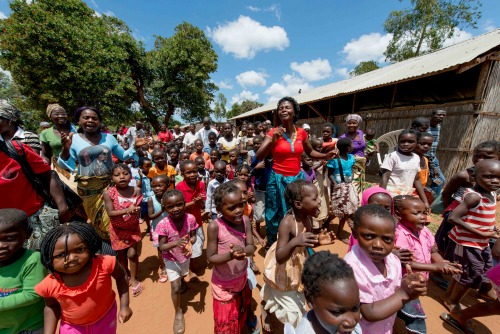
Singing and dancing is the order of the day as this procession of Save the Children preschool graduates, teachers and community members in Mozambique’s Gaza Province makes its way across the school ground to the nearby primary school, where the little graduates will be studying next year. Photo credit: Pei Ketron for Save the Children. October 2013.
In a newly published preschool programs are described as a promising policy option for improving the school readiness and later success of poor and disadvantaged children in rural Africa.
Tonight at 9pm EST World Moms Blog will join Save The Children and Multicultural Kid Blogs at #Moms4MDGs to discuss the importance of early education, and as a specific example, the success of the Save The Children preschool program in Mozambique. Ajla Grozdanic of Save The Children recently returned from a site visit to Mozambique and the early education programs there. She shared her insight in an interview with World Moms Blog as a lead up to tonights Twitter party:
World Moms Blog: In a Chicken & Egg sense, are early education programs only able to be initiated in areas where some basic infrastructure is already in place, i.e. access to clean water, healthcare & nutrition, or are they catalysts for communities to begin to pull out of extreme poverty?
AG: We are able to initiate education programs in communities at any level. In other words, having a basic infrastructure in place is not a pre-requisite for education programs, which can range from in-home daycare to in-school programs.
In fact, early childhood education can bring catalytic change for communities. Early childhood development centers and programs provide an opportunity to reach young children with basic services like healthcare and nutrition, which can be more difficult to deliver if we depended on parents to seek out these services on their own. Early childhood development centers also facilitate community mobilization, bringing parents and other community members together for projects, such as digging wells or cleaning stagnant water that hosts malaria.
Young children naturally learn from and imitate what’s in their environment–good or bad. For this reason, educating young children is key and it fosters the kinds of attitudes and behavior that can improve community well-being over the long term, such as developing good hygiene and healthy eating habits and sharing this knowledge with siblings and neighborhood children.
WMB: Could you explain a bit why Mozambique was a good fit for this program? What is the success rate for other similar early education programs Save the Children runs in other countries?
AG: Mozambique had very low coverage for preschool or early childhood development programs, so the need and demand was high. It’s also important to note that the local communities demonstrated an openness and eagerness to engage in these issues. Communities saw the potential and agreed to invest in their young children. Once they saw the results, which were very good, the word spread and the demand grew.
The World Bank Study, which is the first such evaluation of early childhood development programs in Africa, showed that children in rural Mozambique, who attended Save the Children’s preschool programs, were 24 percent more likely to enroll in primary school and were significantly better equipped to learn than children not covered by the program. While we haven’t had the funding to conduct similar studies in other countries where we offer such programs, our own results monitoring shows a similar success rate across the board.
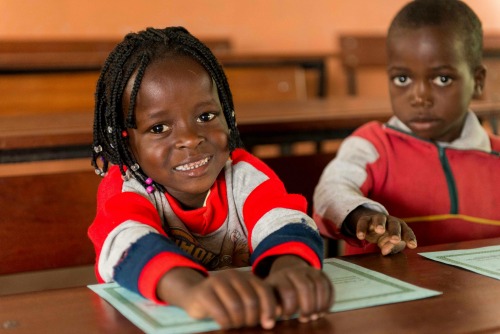
Save the Children preschool graduate, Vania, 5, from the Gaza Province in Mozambique, joined by a future classmate, gets a taste of what it will be like to sit at a real desk when she enters primary school next year. Preschoolers in her village are used to sitting on mats on the floor and were excited to sit in ‘big-kid’ chairs and desks at the nearby primary school. Photo credit: Pei Ketron for Save the Children. October 2013.
WMB: Do you see the benefits in terms of kids who have had these early intervention programs staying in school longer, and particularly for girls, marrying later or are these programs too new to tell yet?
AG: Children enrolled in preschool have a greater chance of going to school, going to school at the right age, and staying in school longer. They have higher graduation rates and are less likely to drop out of school or end up imprisoned. What’s more, staying in school is a mechanism to protect girls from early marriage. While it’s still too early to prove long-term benefits of preschool, such as that it results in girls marrying later in life, we hope to conduct such longitudinal studies in the future.
WMB: Are the children given meals through the program as an incentive for parents to send them or are the community members generally open and willing participants?
AG: It is usually not sustainable to provide meals to all children who are enrolled in preschool. Taking this into account, in most communities preschool lasts for half the school day so children can come home for meals. In some communities, parents might pool their resources in order to provide meals at preschools. In addition, preschools provide an opportunity to educate parents on how to improve nutrition for their child.
The willingness of parents to enroll their children in preschool varies from parent to parent and from community to community. Oftentimes, we’ll have a group of early adopters who are eager to enroll their children and whose success, in turn, inspires a wave of other parents–who prefer a stand-back, wait-and-see approach–to sign up their little ones.
WMB: Had you been to Mozambique before?
AG: No, this was my first time.
WMB: What is the best way people reading could support the Save the Children preschool programs in the developing world?
AG: Your readers could become a sponsor to support early childhood programs in developing countries. They could also advocate to the U.S. government to include preschool and early childhood development in its international aid programs. To learn more, visit www.savethechildren.org.
WMB: How have the mothers responded to these programs? (ie. gives them the opportunity to go to work or tend to smaller children)
AG: We encourage the participation of both mothers and fathers in their children’s education. Sending their children to preschool allows parents to tend to their daily chores, work in the field or otherwise provide for their family while knowing that their children are in good hands and are learning, to boot. In traditional societies, where childcare falls on women, preschools certainly offer an opportunity for women to engage in more productive labor and earn an additional income for their family. And we know from experience that when women earn more income for their families, they tend to invested in their children.
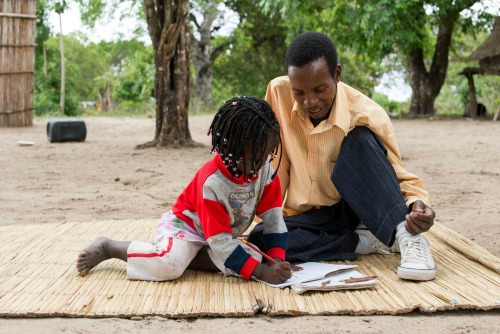
Vania, 5, practices the alphabet and counting every day with her father, Armando, who is a teacher at his daughter’s preschool, which is supported by Save the Children. Photo credit: Pei Ketron for Save the Children. October 2013.
This is an original interview and post for World Moms Blog.
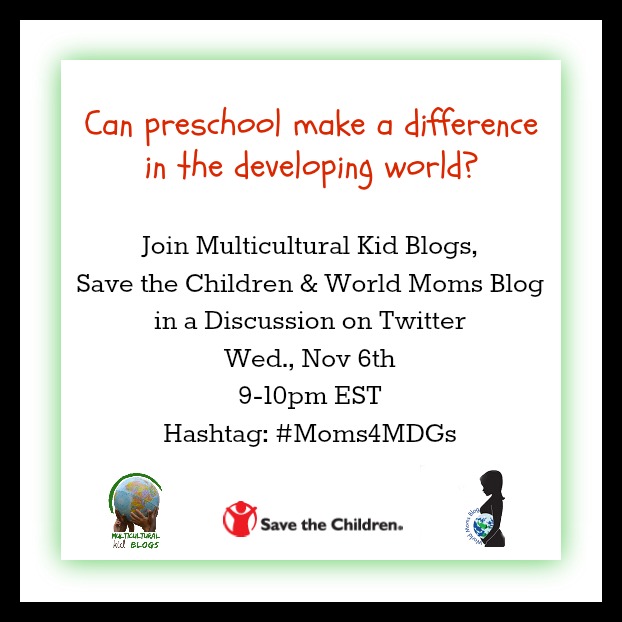

Elizabeth Atalay is a Digital Media Producer, Managing Editor at World Moms Network, and a Social Media Manager. She was a 2015 United Nations Foundation Social Good Fellow, and traveled to Ethiopia as an International Reporting Project New Media Fellow to report on newborn health in 2014. On her personal blog, Documama.org, she uses digital media as a new medium for her background as a documentarian. After having worked on Feature Films and Television series for FOX, NBC, MGM, Columbia Pictures, Warner Brothers, 20th Century Fox, and Castle Rock Pictures, she studied documentary filmmaking and anthropology earning a Masters degree in Media Studies from The New School in New York. Since becoming a Digital Media Producer she has worked on social media campaigns for non-profits such as Save The Children, WaterAid, ONE.org, UNICEF, United Nations Foundation, Edesia, World Pulse, American Heart Association, and The Gates Foundation. Her writing has also been featured on ONE.org, Johnson & Johnson’s BabyCenter.com, EnoughProject.org, GaviAlliance.org, and Worldmomsnetwork.com. Elizabeth has traveled to 70 countries around the world, most recently to Haiti with Artisan Business Network to visit artisans in partnership with Macy’s Heart of Haiti line, which provides sustainable income to Haitian artisans. Elizabeth lives in New England with her husband and four children.
More Posts
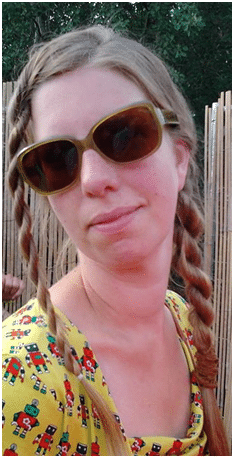
by Katinka | Oct 21, 2013 | Adoptive Parents, Being Thankful, Belgium, Birth Parents, Childhood, Cultural Differences, Domesticity, Family, International, Interviews, Kids, Penguin and Panther, Relationships, Siblings, Special Needs, Uncategorized, Working Mother, World Moms Blog Writer Interview, Writing, Younger Children
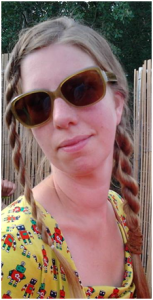 Where in the world do you live? And, are you from there?
Where in the world do you live? And, are you from there?
I was born, raised and proudly remain stuck in the Belgian mud. I would sometimes dream about moving abroad, but it turns out I’m quite happy staying right here. I do like to travel several times a year, mostly for work.
What language(s) do you speak?
My mother tongue is Flemish (which is basically the same as Dutch), but with Belgium being a trilingual country, I also speak French and I can understand German. Obviously, I also speak – and write – English. About ten years ago I also decided to learn Indonesian, but all I remember of it now are the words kamar kecil, which means I can actually ask where the bathroom is if I would make it to Indonesia one day.
In addition, I would love to learn how to read and write music, and to understand Amharic, the first language of our daughter.
When did you first become a mother?
This is a tricky one, because in my experience, I can call on two firsts. Two totally different ways of expecting a child, of becoming a mother, both wonderful and intense. In 2006, I first became a mother when our son was born, the one I love to call our cuddly Penguin. Five years later, in 2011, I first became an adoptive mother when we brought our two-year-old daughter home, our darling Panther.
Is your work, stay-at-home mom, other work at home or do you work outside the home?
Apart from being a full time mom, full time housekeeper and full time wannabe writer, I also have a full time job outside my home. Some might even say I’m building an exciting career as a geomicrobiologist, enabling me to go on missions abroad and to research amazing subjects, but they should know that my favorite moments are without doubt coming home, be it after a working day or a business trip.
Why do you blog/write?
I started blogging (in Flemish) during our adoption procedure, merely as a way to keep friends and relatives posted on any news we would get in those long years. Along the way, blogging became a kind of therapy, enabling me to vent frustrations and personal struggles, or to focus on optimism and fun facts. I also learned just how much I loved to write.
I kept on blogging until our daughter was home for two years. I recently decided to stop, mostly for the privacy of my children and because I felt like I was getting ‘addicted’ to blogging. It was a hard decision, disappointing to quite some readers who liked the plain honesty in my writing. But, as a go-between, I decided to start a low frequency, anonymous, English blog about life with my Penguin and Panther, and to contribute to WMB every once in a while. And in the extra spare time I have now, my newest endeavor is to write children’s books, which has long been a dream of mine.
How would you say that you are different from other mothers?
As a typically modest Belgian, I truly find it awkward to differentiate myself that way. I don’t believe I have something special about me as a mother, or a person for one. But since I have to, well, I guess I would be different from other mothers because my kids come in two opposite colors and with some extra needs. Our blond haired Penguin is an overly sensitive philosopher who understands more than is good for him, while our curly Ethiopian Panther deals with attachment, anxiety and health issues. They leave me both exhausted and enriched every single evening, but I guess that’s no difference to other mothers…
What do you view as the challenges of raising a child in today’s world?
I don’t even know where to begin! Every day is a challenge, when raising children, isn’t it? One of my major concerns though, is to let our children remain children as long as possible. I strive to keep a delicate balance between guarding my children innocence and purity, and still teaching them about the need for respect and care for the less fortunate or for our struggling environment. With today’s society going so fast, having everything within reach, leaving nothing to the imagination, I try to create an island of simplicity and ‘slowness’ for our children (and ourselves!) at home, where they can develop at their own pace. But when time comes, I still want them to be able to catch one of society’s speed boats that are racing by our island…
How did you find World Moms Blog?
I just bumped upon WMB through a cartoon someone shared. I think. My kids often beat me at ‘Memory’, so I can’t be sure about it. But I do remember I started reading and reading and couldn’t stop for another hour.
This is an original interview of our new writer in Belgium, K10K – pronounce it as Ka-ten-ka and you will come quite close to her real name – from The Penguin and The Panther
The image used in this post is credited to the author.
If you ask her about her daytime job, Katinka will tell you all about the challenge of studying the fate of radioactive substances in the deep subsurface. Her most demanding and rewarding job however is raising four kids together with five other parents, each with their own quirks, wishes and (dis)abilities. As parenting and especially co-parenting involves a lot of letting go, she finds herself singing the theme song to Frozen over and over again, even when the kids are not even there...
More Posts

by World Moms Blog | Oct 19, 2013 | Health, World Interviews, World Tour
It is that time of year again. The weather is turning colder, the leaves are beginning to change, Halloween costumes are being picked out, and there is pink everywhere you turn. Yesterday as I was taking my daughter to the park I drove by a large piece of plywood with a painted pink pig on it, 20 or more pink painted pumpkins, and breast cancer ribbons on the lawn of a local realty company. I am sure this serves some purpose, but it was lost on me.
October for me is always bittersweet. While I welcome the awareness, and messages of the importance of self exams and early detection, I am constantly reminded of the disease that took my mother’s life 15 years ago and of my own battle with breast cancer three years ago.

At 32 I was diagnosed with stage II B triple negative breast cancer. Life was good, my husband and I had been married for eight years, my daughter was four months old and my son was a few months shy of his third birthday.
It was a Friday night that I received the news that sent me crashing to the floor. A few days prior to my diagnosis my obgyn told me I was too young to have breast cancer.
Although I knew this to be untrue, I still found comfort in his words and convinced myself it was a clogged milk duct.
Two weeks later I underwent a bilateral mastectomy and four weeks following surgery I began my five month chemotherapy regiment. At the end of my chemo treatment I had genetic testing to see if I carried the BRCA mutation (a.k.a the breast and ovarian cancer gene). I was in fact positive for the gene mutation and for some reason I was surprised by this news, even with my strong family history. The reality then struck me that my children have a 50% chance of inheriting the BRCA mutation, putting them both at risk for breast cancer and other cancers including ovarian, prostate, and pancreatic.
Knowledge is power. Although my cancer journey has been difficult and it was very difficult to hear that my children and sisters could be at high risk, the knowledge that I am a carrier of the BRCA mutation has helped us to stay one step ahead of cancer.
A year following my diagnosis I had my ovaries removed to eliminate the risk of ovarian cancer. I firmly believe that if my mother had had that knowledge, treatment would have been more aggressive and she would have won her battle with breast cancer, before it became metastatic. I also believe that if I had the knowledge prior to my diagnosis, I would have been able to avoid my cancer diagnosis through a prophylactic mastectomy or at least been able to catch it earlier through increased screening.
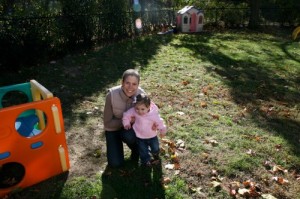
I had heard about the genetic test in my twenties, but I did not know that if I tested positive I could have up to an 85% risk of developing the disease and a 40% risk of developing ovarian cancer. I did not know that I could have had a prophylactic mastectomy that would lower my lifetime breast cancer risk to less than the U.S. national average, which is currently 12%.
However, I do not live in the past. I have embraced my cancer journey and all that has come with it.
Having this knowledge will benefit my sisters and my children most of all.
We make life choices that promote health and wellness and I feel that is a gift I can give my children. One day, they will be armed with the knowledge they will need to make informed decisions as they become old enough to have the genetic testing.
FORCE, Facing our Risk of Cancer Empowered, is a non-profit organization dedicated to supporting families affected by hereditary breast and ovarian cancer through education, support, and resources. There are local chapters throughout the United States and in other countries including Canada, Israel, and Australia. The World Health Organization reports that in 2010 there was more than 1.6 million cases of breast cancer worldwide, making it the top cancer for women in the developed and developing world. Although BRCA mutations are a just a small portion of these cases, there are certain groups that are at higher risk of carrying the mutation. These are people with Ashkenazi (Eastern European) Jewish ancestry and people of Norwegian, Dutch, and Icelandic ancestry.
I am now the Raleigh, NC area FORCE Outreach Co-Coordinator and we are a resource for women in the North Carolina area that have a strong family history of breast cancer or have tested positive for the BRCA mutation. We have support group meetings and work with the local genetic counselors. I am very excited to help bring support and education to families affected by hereditary breast cancer and to make sure women have the information they need to make informed decisions. We need to be our biggest health care advocates and doctors need to get the word out on genetic testing and how it can save lives.
Pink-Tober is in full swing and I hope that we can ignore the commercialism of it (and the giant pink pigs) and focus on its real purpose. Early detection saves lives! If you have a family history, please speak with a local genetic counselor.
If you notice a lump, or any changes in your breasts, get it checked out and don’t allow your concerns to be dismissed by your doctors.
Too many of our mothers, sisters, aunts, cousins, and daughters are losing their battle to this terrible disease. Until there is a cure, we need to focus on education, surveillance, and early detection.
To find out more about FORCE and hereditary breast and ovarian cancer please visit http://www.facingourrisk.org
To find out more about breast cancer in young women go to
http://www.youngsurvival.org
Risk factors for hereditary breast and ovarian cancer
http://www.facingourrisk.org/information_research/publications/documents/brochures-family-history.pdf
From the FORCE website:
How are hereditary cancers different?
- Hereditary cancer tends to occur at an earlier age than the sporadic form of the same cancer, so screening and risk-lowering recommendations for hereditary cancer may be different and may begin at an earlier age
- Hereditary gene changes and the accompanying increased risk for cancer can be shared by relatives and passed on to children.
- People with hereditary cancer have a higher risk for more than one type of cancer. In people who have already been diagnosed with a cancer, this may affect their cancer treatment or follow-up care.
- Specific screening or risk-lowering options are recommended for people at high risk for certain types of hereditary cancer.
Note: If you believe that breast or ovarian cancer runs in your family, you should contact a cancer genetic counselor, geneticist, or equally-qualified health care provider. These health care professionals can help determine your risk for hereditary cancer, inform you of available genetic tests and their benefits and limitations, order appropriate genetic tests, assist with insurance reimbursement of tests, and interpret the test results.

This is an original guest post to World Moms Blog. Katerina is a mom to Nathaniel, 6 and Lillian,4 and two labs Sasha and Dakota. She is a NJ native and recently relocated to Chapel Hill, North Carolina. Kat helped to start a young survivor breast cancer support group at UNC. She is happiest when she is enjoying the fresh air with her family, especially at the beach. Kat is passionate about nutrition and health. She feels so fortunate for every day that she get to spend with her husband and children. Every day is a gift.
Photo credit to Katerina Gmitter
World Moms Blog is an award winning website which writes from over 30 countries on the topics of motherhood, culture, human rights and social good. Over 70 international contributors share their stories from around the globe, bonded by the common thread of motherhood and wanting a better world for their children.
World Moms Blog was listed by Forbes Woman as one of the "Best 100 Websites for Women 2012 & 2013" and also called a "must read" by the NY Times Motherlode in 2013. Our Senior Editor in India, Purnima Ramakrishnan, was awarded the BlogHer International Activist Award in 2013.
More Posts
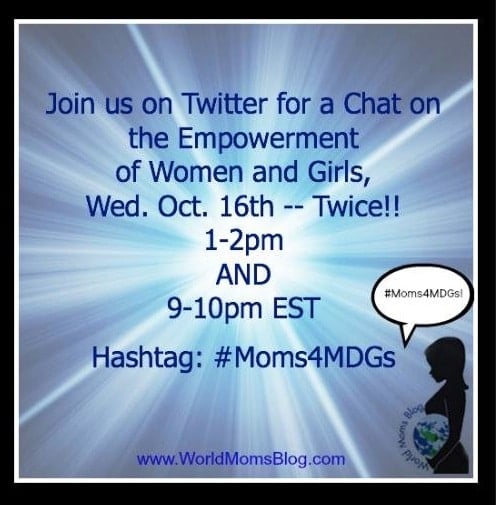
by Elizabeth Atalay | Oct 15, 2013 | 2013, Humanitarian, Millennium Development Goals, Social Good, Social Media, Uncategorized, Womanhood, Women's Rights, World Moms Blog

In 2000, 189 nations made a promise to free people from extreme poverty and multiple deprivations. This pledge turned into the eight Millennium Development Goals, and was written as the Millennium Goal Declaration .- United Nations Development Programme
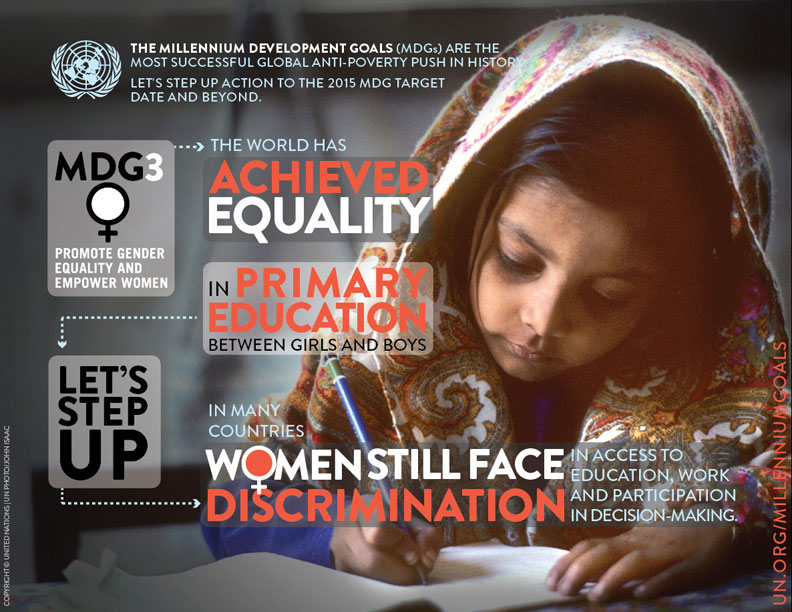
This month as we continue our #Moms4MDG campaign we are joining forces with three dynamic organizations, Al-Nahda in Saudi Arabia, and United Nations Foundation’s Girl Up campaign, and Plan International, all working towards MDG #3.
Al-Nahda is a charitable women’s society dedicated to empowering women socially and economically through the execution of numerous projects and programs with the goal for women to be active partners in the development of Saudi Arabian society.
Girl Up is a campaign of the United Nations Foundation where American girls are given the opportunity to become global leaders and to channel their energy and compassion to raise awareness and funds for United Nations programs that help some of the world’s hardest-to-reach adolescent girls. The goal of Girl Up is a world where all girls, no matter where they live, have the opportunity to become educated, healthy, safe, counted and positioned to be the next generation of leaders.
Plan International is one of the oldest and largest children’s development organizations in the world, working in 50 developing countries across Africa, Asia and the Americas to promote child rights and lift millions of children out of poverty. Their Because I’m A Girl Campaign aims to support millions of girls to get the education, skills and support they need to transform their lives and the world around them.
Millennium Development Goal #3 is to promote gender equality and empower women. Although the initial target of MDG 3 to eliminate the gender disparity between boys and girls in primary education has been reached, there are still huge gaps for women in higher education and the work force. Violence, poverty and discrimination in the work force continue to delay progress for women in many areas of the world. Here, at World Moms Blog, we believe that when women come together we are powerful, and that collectively we can create change.
Join us tomorrow October 16th for our #Moms4MDGs Twitter party to discuss Gender Equality with @GirlUp at 1:00 EST, and with Plan International @PlanGlobal at 9pm EST. By joining in you will automatically be entered to win a copy of Malala Yousafzai’s new book I Am Malala. We hope to see you there!

P.S. Never been to a twitter party before? Go to www.tweetchat.com and put in the hashtag: “#Moms4MDGs during the party times. From there you can retweet and tweet and the hashtag will automatically be added to your tweets. And, from there you can also view all of the party tweets!
This is an original post to World Moms Blog by World Voice Editor, Elizabeth Atalay of Documama in Rhode Island, USA.

Elizabeth Atalay is a Digital Media Producer, Managing Editor at World Moms Network, and a Social Media Manager. She was a 2015 United Nations Foundation Social Good Fellow, and traveled to Ethiopia as an International Reporting Project New Media Fellow to report on newborn health in 2014. On her personal blog, Documama.org, she uses digital media as a new medium for her background as a documentarian. After having worked on Feature Films and Television series for FOX, NBC, MGM, Columbia Pictures, Warner Brothers, 20th Century Fox, and Castle Rock Pictures, she studied documentary filmmaking and anthropology earning a Masters degree in Media Studies from The New School in New York. Since becoming a Digital Media Producer she has worked on social media campaigns for non-profits such as Save The Children, WaterAid, ONE.org, UNICEF, United Nations Foundation, Edesia, World Pulse, American Heart Association, and The Gates Foundation. Her writing has also been featured on ONE.org, Johnson & Johnson’s BabyCenter.com, EnoughProject.org, GaviAlliance.org, and Worldmomsnetwork.com. Elizabeth has traveled to 70 countries around the world, most recently to Haiti with Artisan Business Network to visit artisans in partnership with Macy’s Heart of Haiti line, which provides sustainable income to Haitian artisans. Elizabeth lives in New England with her husband and four children.
More Posts

 The day I gave birth to my son, HJ, is a day I’ll never forget. Induction nightmare? Check. Post baby snuggles? Check. September 3rd birth date? Check.
The day I gave birth to my son, HJ, is a day I’ll never forget. Induction nightmare? Check. Post baby snuggles? Check. September 3rd birth date? Check.

























